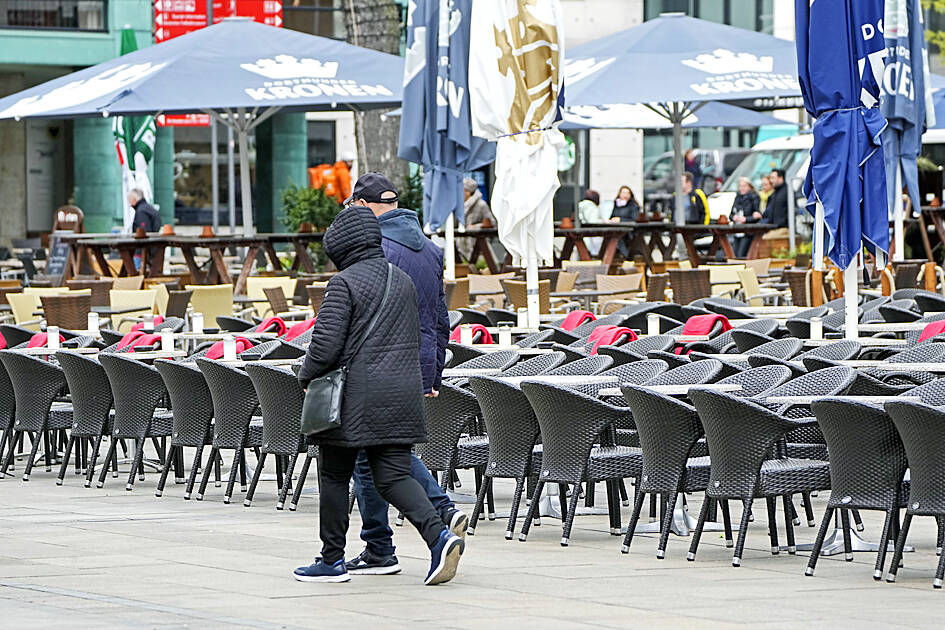German companies are not optimistic of a pickup in Europe’s biggest economy, a survey conducted by the Association of German Chambers of Industry and Commerce showed.
Responses from among 21,000 firms questioned revealed a notable lack of momentum after two quarters of no growth at all, the association said.
“Companies have shown remarkable resilience despite persistently high energy prices, rising interest rates and the war in Ukraine,” association chief executive officer Ilja Nothnagel said in a statement yesterday.

Photo: AP
“However, the outlook for the next 12 months remains murky — especially since incoming orders are noticeably decreasing on the demand side,” Nothnagel said.
The group maintained a prediction for zero growth this year, an outlook that is more pessimistic than the 0.2 percent expansion forecast on Monday last week by the European Commission.
The report comes amid a week focusing on the health of the German economy, with surveys of purchasing managers and the Ifo Institute’s gauge of business confidence due in coming days, which economists have broadly predicted would show deterioration.
On Thursday, a second GDP estimate would show whether unexpectedly weak industrial production has pushed the country into a recession in the first three months of this year.
Most economists have said they think the economy stagnated rather than shrank.
The Bundesbank would tomorrow release its monthly report to update investors on its view of growth, while Bundesbank President Joachim Nagel is scheduled to deliver key speeches this week.
The association’s survey showed that energy and raw materials prices remain the biggest risk for companies, while a shortage of skilled workers is the next-highest danger.
That, along with inflation, means that more than half of respondents saw labor costs as a threat.
“In view of the aging of society, the lack of qualified workers will remain one of the main structural challenges for companies in the future,” Nothnagel said.

Taiwan Semiconductor Manufacturing Co (TSMC, 台積電) would not produce its most advanced technologies in the US next year, Minister of Economic Affairs J.W. Kuo (郭智輝) said yesterday. Kuo made the comment during an appearance at the legislature, hours after the chipmaker announced that it would invest an additional US$100 billion to expand its manufacturing operations in the US. Asked by Taiwan People’s Party Legislator-at-large Chang Chi-kai (張啟楷) if TSMC would allow its most advanced technologies, the yet-to-be-released 2-nanometer and 1.6-nanometer processes, to go to the US in the near term, Kuo denied it. TSMC recently opened its first US factory, which produces 4-nanometer

GREAT SUCCESS: Republican Senator Todd Young expressed surprise at Trump’s comments and said he expects the administration to keep the program running US lawmakers who helped secure billions of dollars in subsidies for domestic semiconductor manufacturing rejected US President Donald Trump’s call to revoke the 2022 CHIPS and Science Act, signaling that any repeal effort in the US Congress would fall short. US Senate Minority Leader Chuck Schumer, who negotiated the law, on Wednesday said that Trump’s demand would fail, while a top Republican proponent, US Senator Todd Young, expressed surprise at the president’s comments and said he expects the administration to keep the program running. The CHIPS Act is “essential for America leading the world in tech, leading the world in AI [artificial

REACTIONS: While most analysts were positive about TSMC’s investment, one said the US expansion could disrupt the company’s supply-demand balance Taiwan Semiconductor Manufacturing Co’s (TSMC, 台積電) new US$100 billion investment in the US would exert a positive effect on the chipmaker’s revenue in the medium term on the back of booming artificial intelligence (AI) chip demand from US chip designers, an International Data Corp (IDC) analyst said yesterday. “This is good for TSMC in terms of business expansion, as its major clients for advanced chips are US chip designers,” IDC senior semiconductor research manager Galen Zeng (曾冠瑋) said by telephone yesterday. “Besides, those US companies all consider supply chain resilience a business imperative,” Zeng said. That meant local supply would

BIG INVESTMENT: Hon Hai is building the world’s largest assembly plant for servers based on Nvidia Corp’s state-of-the-art AI chips, Jalisco Governor Pablo Lemus said The construction of Hon Hai Precision Industry Co’s (鴻海精密) massive artificial intelligence (AI) server plant near Guadalajara, Mexico, would be completed in a year despite the threat of new tariffs from US President Donald Trump, Jalisco Governor Pablo Lemus said. Hon Hai, also known as Foxconn Technology Group (富士康科技集團), is investing about US$900 million in what would become the world’s largest assembly plant for servers based on Nvidia Corp’s state-of-the-art GB200 AI chips, Lemus said. The project consists of two phases: the expansion of an existing Hon Hai facility in the municipality of El Salto, and the construction of a